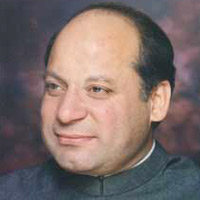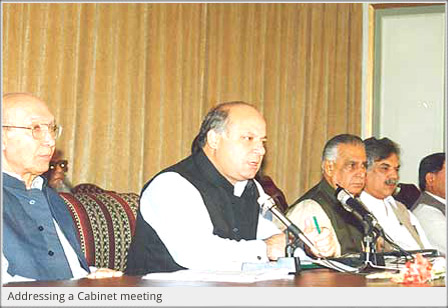 In 2000, Sharif was released from prison and went into exile in Saudi Arabia after agreeing to leave Pakistan for 10 years in exchange for having his imprisonment sentence shortened.In September of that year, Sharif returned to Pakistan in an effort to rally the populace behind the overthrow of Musharraf’s administration after the Supreme Court declared in 2007 that he was permitted to do so. However, in an illegal effort by Musharraf to keep his political rival abroad, he was instructed to return to Saudi. In late November 2007, Musharraf allowed Sharif, his wife, and brother to reach Pakistan on an aircraft provided by King Abdullah. Crowds of supporters greeted Sharif’s arrival, demonstrating his enduring popularity; these celebrations were mostly unobstructed by police. Following his return, Sharif prepared to run in the January elections.
In 2000, Sharif was released from prison and went into exile in Saudi Arabia after agreeing to leave Pakistan for 10 years in exchange for having his imprisonment sentence shortened.In September of that year, Sharif returned to Pakistan in an effort to rally the populace behind the overthrow of Musharraf’s administration after the Supreme Court declared in 2007 that he was permitted to do so. However, in an illegal effort by Musharraf to keep his political rival abroad, he was instructed to return to Saudi. In late November 2007, Musharraf allowed Sharif, his wife, and brother to reach Pakistan on an aircraft provided by King Abdullah. Crowds of supporters greeted Sharif’s arrival, demonstrating his enduring popularity; these celebrations were mostly unobstructed by police. Following his return, Sharif prepared to run in the January elections.
Bhutto, who had just received permission to go back to Pakistan, was killed in Rawalpindi in December 2007 while running for office. The PML-N came in second place to Bhutto’s party, led by her husband Asif Ali Zardari, in the February 2008 elections, winning nearly one-fourth of the parliamentary seats up for grabs.
The two parties established a coalition administration in March. In the months that followed the coalition’s establishment, disagreements surfaced. However, the coalition moved to file impeachment allegations against Musharraf in August 2008, and on August 18 Musharraf resigned in response to the forthcoming hearings.
September, Zardari was elected as President but when the Supreme Court decided to remove Sharif’s brother from his role as Punjab’s chief minister and impose a ban barring Sharif too from holding political office in February 2009, tensions between Zardari and Sharif grew.
The court’s decisions, according to Sharif, were influenced by politics and supported by Zardari. The status of the Supreme Court judges who were fired under Musharraf and have not yet been reinstated, however, continues to be a key point of contention between the two adversaries. In order to hold a rally in favour of the judges’ reinstatement, Sharif escaped an effort to place him under house arrest in March 2009 and made his way to the capital.
The Supreme Court overturned the February decision upholding a restriction restricting Sharif’s political activities in late May, and in July Sharif was exonerated of all charges related to a hijacking. Sharif was able to run for public office when the final legal hurdle had been removed against him. Sharif continued to speak out against Zardari and the Pakistan People’s Party (PPP).
Following an impressive political comeback in 2013, Sharif was elected to a third term as prime minister after the PML-N triumphed comfortably in the May legislative elections. However, the victory wasn’t without controversy. Imran Khan’s Tehreek-e-Insaf, the opposition party, declared the elections to be stolen and staged months-long protests in Islamabad.
By promoting better ties with India, promising to stay out of Afghanistan after NATO troops withdrew in 2014, and attempting to reach a settlement with Tehrik-e-Taliban Pakistan (TTP), an Islamist guerrilla force based in Pakistan and unconnected to the Taliban in Afghanistan, Sharif infuriated military leaders. These viewpoints ran counter to the security objectives of the armed forces. When opposition demonstrations in 2014 offered the military a chance to remove Sharif with popular support, the military instead took advantage of the chance to put pressure on Sharif to defer to the military on issues of foreign policy and defence.
In the meanwhile, the administration found it difficult to counteract terrorist strikes. Following the TTP’s deadly attack in December 2014 that left over 150 people and children dead at a school in Peshawar.
As a result of a corruption investigation, Sharif was forced to retire in 2017, ending his third tenure as prime minister. The Panama Papers, a massive collection of international financial documents that were leaked to the press in 2015, contained information linking three of Sharif’s children to shell companies that had been used to buy real estate abroad, heightening suspicions of corruption that had been a constant companion throughout Sharif’s political career. Despite Sharif’s denial of any wrongdoing, the Supreme Court decided to strip him of his office in July 2017. While his brother Shehbaz Sharif was chosen to lead the PML-N in the next elections, he resigned and departed for London.
Nawaz Sharif was sentenced to 10 years in prison in July 2018 after being found guilty in absentia of possessing assets in excess of his salary. His well-known daughter Maryam Nawaz Sharif was found guilty of aiding and abetting a crime and given a 7-year prison term. They returned to Lahore on July 13 to complete their sentences.
Two weeks later, elections were held, and Khan’s Pakistan Tehreek-e-Insaf (PTI) won the majority of the vote, dealing the PML-N government its fatal blow. The PML-N, the PPP, and other parties raised worry over possible military meddling in the polls; from prison, Sharif claimed the vote had been rigged. The PML-N gave over the win to the PTI.
Kulsoom, Sharif’s wife, passed away from cancer on September 11. leave was granted to Nawaz and Maryam so they could attend her funeral in Lahore. After a few days, on September 19, a judge delayed their sentences and ordered their release until the results of their appeals. He was unable to show the source of revenue that had allowed him to acquire one of his assets, therefore on December 24 he was given a seven-year prison term and a $25 million fine. He was granted medical bail in October 2019, and a few weeks later he departed Pakistan even though he, his daughter, his brother, and his party were still facing legal issues there.
Sharif played a key role in the foundation of the Pakistan Democratic Movement (PDM) in 2020, an alliance of opposition parties working to lessen the military establishment’s influence in civilian rule. He charged that the army had rigged Khan and his party’s election. A vote of no confidence was passed in the National Assembly in April 2022, removing Khan from office. The parliament then chose Shehbaz Sharif to take over as prime minister.
Last Updated: Apr 2023
Muhammad Nawaz Sharif was born in Lahore on December 25, 1949. He is the eldest son of Muhammad Sharif, a joint owner of the Ittefaq Group of Industries.
Nawaz Sharif got his schooling from Saint Anthony’s High School. After graduating from Government College Lahore, he obtained his Law Degree from the Punjab University.
Nawaz Sharif remained a member of the Punjab Provincial Council for some time. He joined the Punjab Cabinet as Finance Minister in 1981. He was able to raise the allocation of funds for the development of rural areas to 70 percent of the Annual Development Program in the Province. He also held the portfolio of Sports and was able to reorganize the sports activities in the Province.
In the general elections of 1985, Nawaz Sharif won with an overwhelming majority, both in the National and Provincial Assemblies. On April 9, 1985, he was sworn-in as Chief Minister of Punjab. On May 31, 1988, he was appointed caretaker Chief Minister, after the dismissal of Assemblies by General Zia. Nawaz Sharif was again elected as Chief Minister after the 1988 general elections. A massive uplift of Murree and Kahuta was undertaken during his term as Chief Minister of Punjab.
On November 6, 1990, Nawaz Sharif was sworn-in as Prime Minister of the country, after his alliance, I. J. I. won the October 1990 elections. However, Nawaz Sharif could not complete his term of five years, and was dismissed by the President in April 1993. He was reinstated by the superior Judiciary, but had to resign along with the President in July 1993.
During his tenure as the Prime Minister, efforts were made to strengthen the industries with the help of private sector. Projects like Ghazi Brotha and Gawadar Miniport were initiated. Land was distributed among landless peasants in Sindh. Relations with the Central Asian Muslim Republics were strengthened and E. C. O. was given a boost. In an attempt to end the Afghan crisis, the “Islamabad Accord” was reached between various Afghan factions. His most important contribution was economic progress despite American sanctions on Pakistan through the Pressler Amendment.
Pakistan Muslim League again won the elections held in February 1997, and Mian Nawaz Sharif was re-elected as Prime Minister with an overwhelming majority.
Taking advantage of his absolute majority in the National Assembly, he added a landmark in the constitutional history of Pakistan by repealing the controversial Eighth Amendment. This Thirteenth Constitutional Amendment stripped the President of his powers, under Article 52(b) of the Eighth Amendment, to dismiss the Prime Minister and dissolve the National Assembly. He added another milestone to the Constitution when his Parliament adopted the anti-defection Fourteenth Amendment Bill. His development venture of the Lahore-Islamabad motorway has also been appreciated by a segment of the society, while others have criticized it for being an extravagance for a developing country.
During his second tenure, his working relationship with the apex court severed, and his differences with the Chief Justice came out in public. He also developed an uneasy relationship with the President, Farooq Leghari, who had earlier been his major political opponent. With the passing of the Thirteenth Amendment, the President was on a direct collision course with the Prime Minster. A few months later, this, and the dramatic confrontation with the Judiciary, culminated in the removal of the Supreme Court Chief Justice, Sajjad Ali Shah, and on December 2, 1997, the resignation of President Farooq Leghari.
On October 12, 1999, the civilian Government headed by Nawaz Sharif was overthrown by a military coup. Controversy over the Kargil operation, corruption charges, and the “Plane Conspiracy” case are considered to be the main reasons for his ouster.
After an extensive trial, Nawaz Sharif was charged and found guilty in the “Plane Conspiracy” case. On request of the Saudi Royal Family, the Government of Pakistan exiled him to the Kingdom of Saudi Arabia, where he now lives with his close family.
Several cases of corruption against him are still pending decision in local courts.
The Pakistani politician and one of the biggest industrialist is now 3rd time Prime Minister of Pakistan after 2013 elections. Previously he served as Prime Minister for two terms from November 1990 to July 1993 and from February 1997 to October 1999.He is the president of Pakistan Muslim League (N), which is currently Pakistan’s largest political party, and has formed the government with majority. However they have taken small parties in their coalition and formed their government in May 2013.By land sliding victory in recent elections in Punjab he has proved to everyone that he is still the undisputed “Lion of the Punjab and Tiger of Pakistan”.
This article was last updated on Aug 2013






